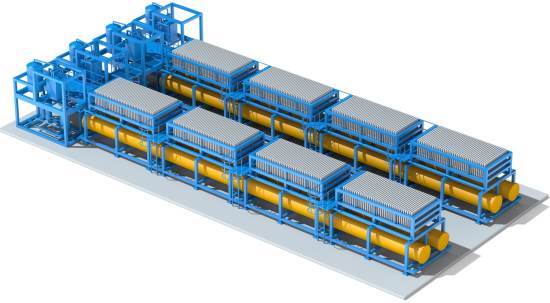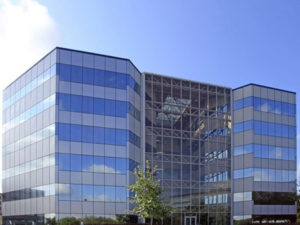thyssenkrupp recently introduced industrial-scale water electrolysis for large projects. By splitting water into hydrogen and oxygen, this technology delivers “green” hydrogen, a clean, CO2-free energy carrier. The only inputs needed are water and renewable electricity from wind, hydro power or photovoltaics.

20 MW module.
“Green” hydrogen production is suited for long-term energy storage, hydrogen mobility and other applications, making optimal use of renewable energy sources.
thyssenkrupp says that its solution makes large-scale hydrogen production from electricity economically attractive. The advanced water electrolysis features a well-proven cell design paired with an especially large active cell area of 2.7 m2. By further optimizing the proven “Zero-Gap” electrolysis technology (leaving virtually no gap between membrane and electrodes), very high efficiencies of more than 82% are achieved.
To make deployment of large hydrogen projects as easy as possible, the thyssenkrupp technology is available in pre-fabricated, skid-mounted standard modules. They easily add up to the desired project size, potentially into the hundreds of megawatt range.

The patented design is based on thyssenkrupp’s well-proven, leading electrolysis technologies. To date, the Group company thyssenkrupp Uhde Chlorine Engineers has successfully completed more than 600 electrochemical plants worldwide.
Within the Carbon2Chem project, one of the global flagship projects for carbon-neutral value chains, the advanced alkaline water electrolysis by thyssenkrupp was already commissioned successfully. It will provide the necessary hydrogen for producing chemicals from steel plant flue gas.
Hydrogen is not only a clean energy carrier, be it for long-term energy storage in the gas grid, or for clean fuels e.g. for fuel cell mobility. When produced from renewable energy, it can make the production of key chemicals sustainable. One good example is “green” ammonia: With the water electrolysis technology and its world-class ammonia process, thyssenkrupp can deliver integrated plants which can produce ammonia from nothing but water, air and sunlight or wind. The ammonia can be further processed into fertilizers. (Earlier post.)
As a specialist in chemical plant engineering and construction, thyssenkrupp can realize additional value chains, e.g. for “green” methanol, which can enable carbon recycling to generate sustainable fuel. Further “power-to-gas” solutions include methanation for the production of synthetic natural gas (SNG).

